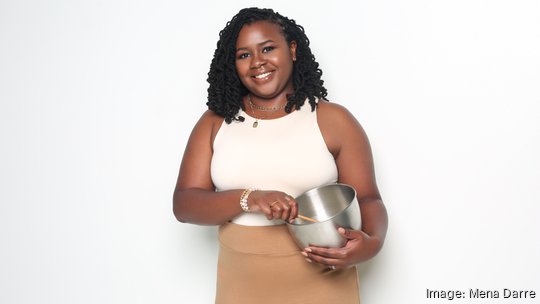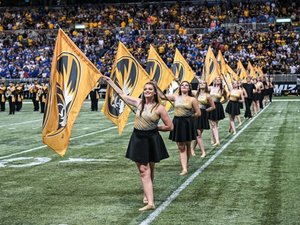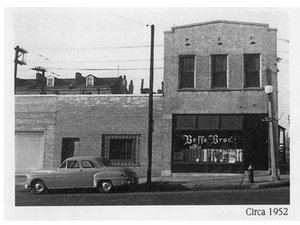Candera Thompson has traveled across the country to New York, Los Angeles and Atlanta as she’s built her beauty care brand Bask & Bloom Essentials.
After all that travel, she came to a conclusion: She'd rather stay in St. Louis than relocate to one of those fashion hotbeds.
“It would be great to not have to do that,” she said.
Thompson founded Bask & Bloom in 2015 to market specialized shampoos and conditioners to women dealing with postpartum shedding and hair damage. She's also among a growing group of Black, female entrepreneurs leading beauty startups in St. Louis, like hair extension company Rebundle, fragrance startup Moodeaux and hair care brand Florae Beauty.
It's a cluster of companies that has caught the eye of one prominent St. Louis entrepreneur: Build-A-Bear founder Maxine Clark. Citing St. Louis’ history in Black beauty entrepreneurship with Madam C.J. Walker and Annie Malone, who became millionaires in the early 1900s after launching beauty careers in St. Louis, Clark believes St. Louis has an opportunity to build from that history to create another emerging growth category for the region.
“The beauty industry is $450 billion and Black beauty is a fast growing segment at well over $1 billion a year. St. Louis could easily become a hub for Black beauty brands and I believe we can attract even more companies here to tap into this heritage,” Clark said in an email.
Over the past 30 years, St. Louis has succeeded in building a vibrant entrepreneurial ecosystem in areas like bioscience and agriculture, building off the foundational corporate giants like Bayer/Monsanto, Bunge, Pfizer and Mallinckrodt.
Clark and several other entrepreneurial advocates are now trying to do the same around another cornerstone of the regional economy — consumer products. These advocates believe it's a sector where St. Louis has advantages, being home to major consumer brands like Anheuser-Busch and Energizer, or holding companies of various consumer packaged goods, such as Post Holdings, Caleres and Nestle Purina. The region also has an advantage in its central location, which makes shipping products easier and more affordable.
It's an idea that's already moved beyond the theoretical. A new organization, Food City, launched in August with a mission to boost the region's food manufacturing sector and fund food-focused startups, and a new retail trade show is set to debut next month to help more St. Louis consumer brands reach nationwide audiences. Clark also teased out this detail: She's working on a project to boost the profile of Black-owned beauty brands in St. Louis, but isn't quite ready to share details.
“The tech ecosystem of St. Louis has had a decade-plus of these types of resources trying to build and incubate and give people the opportunity to try out new ideas,” said Darren Jackson, executive operations director of the Food City initiative. “We have really incredible talent and entrepreneurs in the area, but getting their products validated and to be able to be on shelves and scalable has been a challenge.”
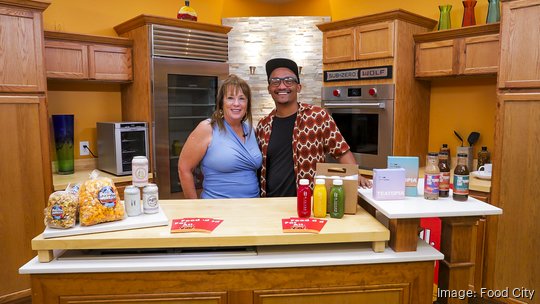
Upfront effort
Food City has so far hosted three community dinners to promote its mission of creating an “inclusive, sustainable food ecosystem” in St. Louis, with a priority on boosting food entrepreneurship by providing funding and resources to local consumer packaged food brands.
An estimated 40 to 60 people attended each dinner, a figure that caught Jan Marson by surprise.
“There’s a lot of young talent and energy around food here,” Marson said.
Food City is a project of Serving Our Communities, the family foundation founded by Marson and her husband, Dave. The Marsons were owners of Reno, Nevada-based Nature’s Bakery, a manufacturer of plant-based, nut-free and dairy-free snack products that operates a plant in Hazelwood. The brand was acquired in 2020 by energy bar maker Kind in a $400 million deal. They currently own and operate Marson Foods, a waffle company that has a 147,000-square-foot production facility in Hazelwood.
While originally from Nevada, the Marsons were introduced to St. Louis when Nature’s Bakery in 2014 acquired the assets of Theodoro Bakery in Hazelwood. They saw opportunity here, with St. Louis’ history of being home to consumer products companies, its workforce and central location.
“It’s a great manufacturing opportunity,” Marson said.
Food City aims to give more entrepreneurs a chance to take advantage of those resources. It is operating with a two-fold approach in boosting entrepreneurship locally. It first wants to create a community and cluster of food products companies, helping to provide resources, connections and networking. With that in place, it then wants to help spur “real-life tangible wins" for growing companies and launch successful workforce development initiatives.
“It takes this type of effort up front,” said Jackson, who also serves as chief operating officer of Serving Our Communities. “There are incredible opportunities within the manufacturing space and we’re not training people for it on the entrepreneurship side or the workforce side. We have the space for it. We have the resources for it. We have the mentors for it. We have the actual proof of concepts that have worked all over St. Louis. Instead it kind of sits in the shadow.”
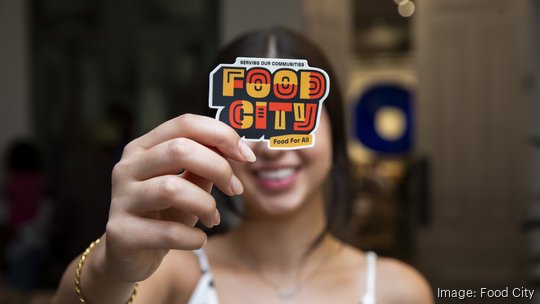
The idea for Food City is to assist potential business owners, whether they be new entrepreneurs, restaurants looking to branch into retail or farmers with innovative food ideas, who may not have manufacturing or business operations experience. It also wants to help existing brands ramp up production and distribution.
That will include hosting a competition for $150,000 in grants later this year: a $75,000 growth grant for an existing, local food products company and an additional $25,000 grant to finance another company with production. It will also award $50,000 to new food brand to help it launch operations. Smaller grants focused on food accessibility and environmental justice in food production will also be given out by Food City. There have been 60 applications submitted for the grant competition so far.
Jackson isn't certain whether the grant competitions will be an ongoing program for Food City. How the organization provides support moving forward will be determined by the needs of entrepreneurs. To help understand those needs, Food City has hired Keisha Mabry Haymore as community manager. It's also conducting a survey to better understand the needs of the food system locally, the results of which are expected to publish in the first quarter of 2024. Food City said it has received 225 survey responses, with goal of at least 1,000 submissions by the end of 2023.
“We really see this as a living kind of process,” Marson said.
'It's hard to learn the ropes'
First up was Maxine Clark. Then it was Lisa Govro of Big Heart Tea Co. and Akeem Shannon of phone accessory company Flipstik, a pair of local startups that have found success landing their products in national retailers.
The trio was part of a group of consumer products founders who spoke to nearly 30 entrepreneurs on a recent Friday morning, sharing how they expanded their brands and product distribution beyond St. Louis.
Their remarks were part of a daylong event described as providing “trade show training wheels” ahead of a new consumer products retail trade show planned for next month in Frontenac. It’s a project of Emerge The Agency, a St. Louis-based consulting and brand strategy firm launched in August. Its co-owners, Jessica Conick and Daphne Benzaquen, have backgrounds in working locally in the consumer products industry. Conick formerly worked at retailer Soft Surroundings and Benzaquen has her own fashion brand, Daph.

The upcoming retail trade show, called Emerge the Show, seeks to help local consumer products companies better understand how to expand their brands by selling products wholesale to retailers. Its goal is to help St. Louis brands reach a national audience by expanding beyond e-commerce sales and pop-up markets. Conick said it’s not uncommon for consumer startups to struggle with expansion beyond local markets or direct-to-consumer sales, which can cause them to stall, especially as customer acquisition costs from digital marketing increase.
“To stay viable and to grow, you have to scale through different ways and wholesale is one of those huge ways,” Conick said.
The Oct. 12 Emerge the Show event, being held at Saks Fifth Avenue in Plaza Frontenac, will feature around 50 local product-based companies with at least 100 retail buyers attending. One of the companies planning to attend the upcoming trade show is All Things Elderberry, which sells elderberry wellness products like gummies and teas. It has landed its products in pharmacies and independent retailers and recently expanded into Fresh Thyme Market, said founder Emilia Rizzuto. She wants the brand to expand into national retail chains and hopes the upcoming show can help her understand how to achieve that.
“It’s hard to learn the ropes. From experience trying to get into some of these stores, it’s not that easy. There’s distributors involved, there’s brokers involved. There’s different ways of shipping involved,” she said. “You can’t just be like ‘hey, I’ve got a great product, let me in the door.’”
Conick and Benzaquen want the upcoming trade show to result in local consumer products brands landing more wholesale deals while also preparing them to attend larger trade shows in other cities. Beyond the tangible outcomes, they hope these events help forge stronger connections between local consumer products founders so they can grow their businesses collectively.
“Sometimes being an entrepreneur is lonely so forming an authentic, organic group for at least a month or so is something I think is special and I think it will have a bigger impact,” Benzaquen said.
One of the attendees at the recent wholesale training conference was Ashley Morgan, founder of Whip It Goods Skin Care. Morgan last year founded the plant-based skin care brand after a career in technology. The idea was to make skin care products for her daughter who has eczema.
Morgan's background is in the technology, and she's seen how capital can flow to promising companies in that sector. She’s encouraged to finally see more investment and resources being directed to consumer startups, especially beauty brands.
“For so long we’ve been marginalized and behind the scenes," she said.
